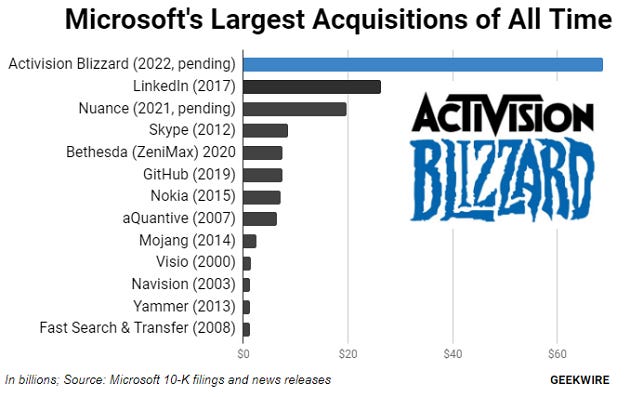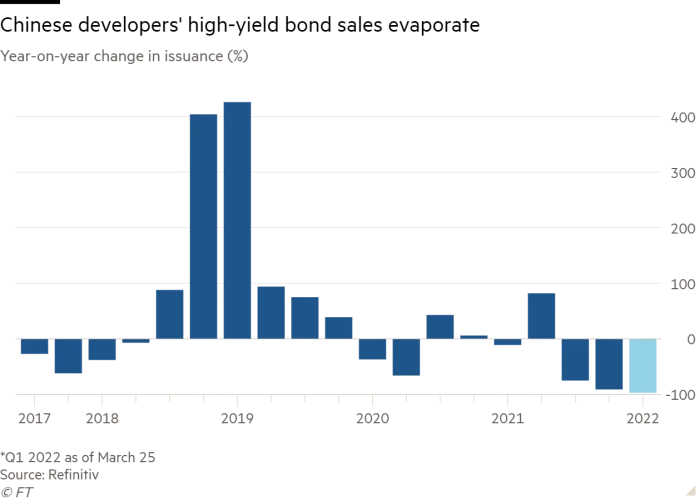Microsoft's largest acquisition ever
Of video games, a real estate debt crisis, and wage transparency
A video game titan is swallowed
Microsoft will be making its largest acquisition ever, buying video game giant Activision Blizzard for USD95 a share, in an all-cash transaction valued at nearly USD69 billion.
This deal is the largest acquisition in the tech industry ever, eclipsing Dell’s acquisition of EMC in 2015 which was valued at USD67 billion.
The size of the two deals have drawn comparison, but here’s where they differ in incredibly important ways:
Dell and its primary backer Silver Lake acquired EMC to secure its enterprise data storage capabilities, much of it in hardware. The Microsoft acquisition will be of a video game company, much of its value in software, talent, and intellectual property.
Dell took on close to USD40 billion in debt to finance the deal. In 2018, it went public once more to raise funds and has since grown considerably, rewarding its shareholders handsomely and beating then sceptics. The Microsoft acquisition is in all cash.
An important observation: gaming companies have become an increasingly important part of Microsoft’s acquisition strategy. Activision Blizzard in 2022 (Warcraft, Starcraft, Call of Duty), Bethesda-Zenimax in 2020 (Fallout, The Elder Scrolls), Mojang in 2014 (Minecraft), Obsidian (Pillars of Eternity), InXile (Wasteland 2), among its already impressive roster of in-house studios.
Microsoft recently revealed that it sells its video game hardware at a loss, to drive software/ services sales. A robust content pipeline ensures more subscribers to its monthly Xbox Game Pass, a service that allows users to play a wide selection of games as much as they want. The move clearly marks Microsoft doubling down into its content strategy of becoming the Netflix of games.
There’s a major push towards content generation, with video games representing the most profitable and fastest growing segment of entertainment. It’s an area we are keenly observing for future opportunities.
Locked out of debt market
Meanwhile in China, the spiralling Evergrande crisis has essentially locked out real estate companies from the global debt market, with high yield bond issuance by Chinese developers in Q1 2022 down by a whopping 97% year-on-year.
The situation means rapidly escalating borrowing costs for Chinese real estate companies and a growing inability to raise new sources of cash. Property companies are typically heavily reliant on debt and frequently encounter cash flow issues; this drought could very well trigger further defaults in the Chinese market.
While this presents an opportunity for private companies to bridge the funding gap, our take is that this represents the latest saga of an unsustainable debt cycle that needed to wind down eventually. Debt can be a powerful financial instrument but is something to be wielded as a fine tool, not a sledgehammer.
Towards wage transparency
On 4 March 2021, the European Commission proposed legal measures on wage transparency to reduce pay inequality between men and women. The proposal sets out key steps including:
Employers will have to provide pay level/ range information in job posts
Employers will not be allowed to ask workers about their pay history
Employees will have the right to ask employers about average pay levels, broken down by sex, for categories of workers doing the same work or work of equal value.
Employers with at least 250 workers must publish information on the pay gap between female and male workers in their organisation
Today, as of 6 April 2022, the European Parliament voted overwhelmingly in favour of the above measures, and even voted to enact even stricter requirements, including reducing the workforce threshold to 50 instead of 250 for pay gap disclosure.
These measures, which include the possibility of sanctions for non-compliance, could very transform the entire landscape of labour across the EU. In a few years’ time, these steps may very well become the industry standard globally.
Until next month,
Ong Kar Jin
CSO at nØught labs
Kar Jin (or KJ for short) is a researcher, writer, and strategist. He was previously a public affairs analyst before plunging deep into the tech industry, working on blockchain, fintech, and tech ethics as a strategy lead. He graduated from Yale University with a BA in History (Honours), focusing on genocide and ethnic conflict in Southeast Asia.




